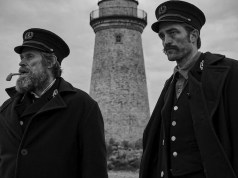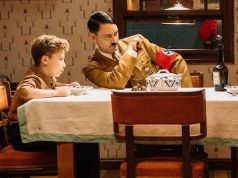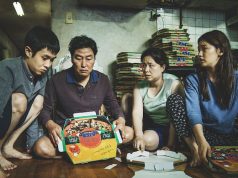If you ever find yourself in Spain, do not visit any orphanages, for they are all haunted. Guillermo del Toro has taught us this, first by directing the chilling “Devil’s Backbone” and now by producing something simply called “The Orphanage,” which is as tingly and creepy a ghost story as you could wish for, recalling classics like “Poltergeist,” “The Sixth Sense,” and “The Others.”
Our story unfolds thanks to the actions of someone who apparently never learned that lesson about orphanages. Her name is Laura (Belén Rueda), and she has recently bought the orphanage she grew up in, intending to fix it up and use it as a home for special-needs children. She and her husband, Carlos (Fernando Cayo), are making the necessary repairs while their adopted little boy, Simón (Roger Príncep), plays with his imaginary friends. Laura and Carlos figure he’ll grow out of that once some real children move in.
As you have no doubt surmised, Simón’s friends soon prove to be slightly more than imaginary, and strange occurrences ensue. Finally, on the day of the open house, Simón disappears. He cannot be found. Laura and Carlos are heartbroken, Laura in particular. The cherubic lad is sick and needs medication regularly. Where could he be?
Days pass. Laura starts to hear things. Objects within the house inexplicably appear in places she didn’t put them. She hires a psychic (Geraldine Chaplin) and her crew to investigate the house for signs of paranormal activity, while Carlos scoffs.
The lean and thoughtful screenplay (by first-timer Sergio G. Sánchez) includes all the ingredients needed for a shivery ghost movie, first in the huge, dark house itself, and then in the nearby lighthouse, caves, and rocky seashore. There’s a kid running around in an extraordinarily unsettling scarecrow-face mask. A bug-eyed old social worker named Benigna (Montserrat Carulla) shows up to inquire as to Simón’s health; that night Laura catches the old bat lurking in the tool shed with a shovel! Later Benigna is involved in something surprising and horrible and fantastic. I could list delightfully creepy details like this all day.
There is imagination in the “games” played by the ghosts, which Simón explains to Laura, and director J.A. Bayona — making his first feature film — creates urgency and panic in them, too. A few of the film’s scares are cheap tricks like things popping out suddenly, but an impressive majority are better than that. The story creates situations that are genuinely suspenseful and nerve-racking, scary without being gross — well, except for one part — and liable to make you jump and laugh and cover your eyes and grab your armrest and maybe look behind a few doors before you turn off the lights tonight.
The unexpected element is that it’s not just a ghost story. It’s also a fable about motherly love and devotion, and a remarkably tender one at that. Belén Rueda’s performance as the frantic Laura is poignant, sure to earn the sympathy of every parent in the audience. A movie can be great solely on the basis of being scary, of course, but an added dimension like this one really helps it hit home.
A- (1 hr., 45 min.; Spanish with subtitles; )





